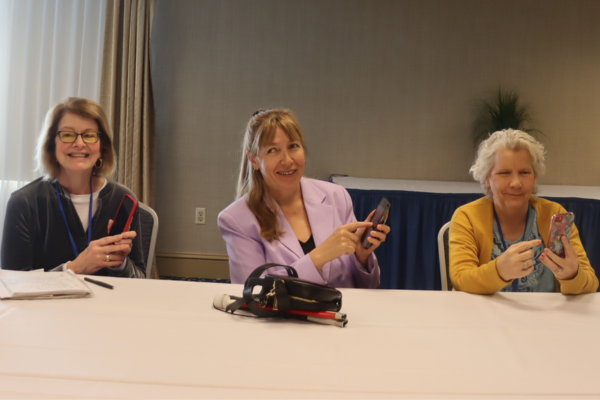
Embracing technology comes more naturally to some more than others. Often we learn something out of necessity. If you plan on living independently, you’d need to learn the CCP basics; e.g. cooking, cleaning, and paying the bills.
What are the basic necessities of assistive technology?
Perhaps they are not much different from the basics of independent living. Cooking with vision loss is tied to many aspects of technology.
Cooking
For example, you might use an app such as Instacart to order the food you want. In order to do this, you’ll need to know how to make low-vision adjustments on your smart phone to see the screen better. There are a host of options within settings and accessibility to enlarge text, bold text, invert polarity and so onto maximize your experience. Another option might be to use a screen reader, such as Talkback or Voiceover to navigate the screen and place your grocery order.
Once you have your groceries, it’s time to start cooking. Recipes can also be found online just by navigating your browser; whether it is Google Chrome, Safari, or etc. With your smart phone you can search for, locate, and explore endless amazing recipes. Ultimately, cooking can be quite creative!
Cleaning
Cleaning must be tackled or you’ll find yourself not in a comfortable friendly environment, but a pit! Yes, I mean a pit! there’s no way around the necessity of cleaning. Here’s where there are actually some fun and efficient solutions using technology. Autonomous robotic vacuum cleaners like the Roomba help take care of this for us. Some of them wash the floors too.
What’s the catch? You’ll need to learn how to operate the associated app with the same type of accessibility adjustments mentioned above or the use of a screen reader. Alternatively, you can connect smart appliances to your Amazon Alexa and simply speak commands and voila; the device will be working for you. In fact, there are lots of smart appliances which open up a world of independence.
The LG ThinQ App works nicely with their dishwashers, front load washer, dryer, and more! Samsung also has a lot to offer. I dare conclude here that cleaning can be very constructive!
Paying the Bills
Last, but certainly not least, part of remaining independent means being able to pay our bills. Access to bank accounts, heating, electric, and all of the finances is key to success in living on one’s own. You’ll need to approach this carefully. There may be times when you prefer to bank online through your establishment’s website. Low vision accessibility adjustments can be made on your Windows PC. Otherwise a screen reader such as JAWS, NVDA, or Windows Narrator may be the best solution.
Many mobile banking apps are also now fully accessible, making it possible to view live balances, move money across accounts, and even pay bills with minimal taps and/or gestures on your smart phone. Automatic bill pay also helps tremendously. If you are fairly new to online and mobile banking, the Consumer Financial Protection Bureau has great tips for beginners.
Whether you’ve lived on your own for one week or what seems like forever, CCP or cooking cleaning and paying bills are fundamental; what you put into your independence is what you’ll likely get out of such efforts. The same holds true for your accessible technology. The patience, learning and practice applied to technology will show its rewards in every day living
Where can you learn? Future In Sight is a great place to take advantage of the free online technology workshops open to anyone who is blind or visually impaired. We are also able to work one on one with people here in New Hampshire.
With technology as your friend, you’ll tackle CCP-not just cooking, cleaning and paying bills, but move beyond with creative, constructive, and practical fundamentals of technology for every day living!
About the Author: Stephanie Hurd is the Assistive Technology & Activities Specialist at Future In Sight.

